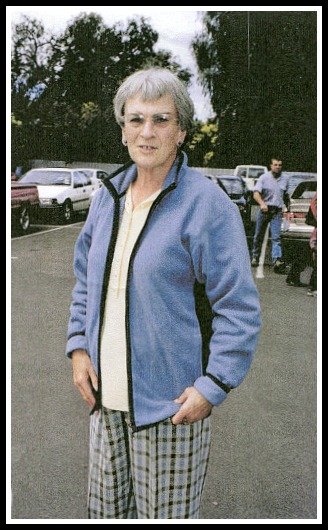
By Carol Altmann
Meet Marilla Lenne, the “secret” daughter of Edna Jones, one of the two “Jones Girls” who for decades owned and operated one of south-west Victoria’s most desirable grazing properties, The Union Station, at Woolsthorpe, and who left a legacy worth millions.
Until now, only a small group of people – among them some well-known names in our community – have known of Marilla’s existence, with both Edna and her older sister, Gwen Jones, widely thought to have died unmarried and childless.
Indeed The Gwen and Edna Jones Foundation was established as a private charity to handle the sisters’ multi-million dollar estate because, according to its website, “neither sister (had) an heir to whom they could bequeath their considerable assets”.
The Foundation, which in 2016 had assets worth more than $15 million, was launched after Gwen’s death in 2000.
It has since donated hundreds of thousands of dollars to local projects and made significant contributions to the Presbyterian Church, particularly in its support of Warrnambool’s King’s College and, most recently, its purchase of several church buildings in Warrnambool.
But Edna, who died in 1995, did have a child at the age of 30.
The baby was a girl, born in a Melbourne hospital on 28 October 1940 and given up immediately for private adoption.
The fact Edna had a baby may be a surprise, but the adoption less so. While the circumstances of Edna’s pregnancy remain unknown, the moral standards of the time stood in harsh judgement of women and girls who had babies out of wedlock.
It is worth remembering that this was an era when family skeletons were tucked firmly into closets.
What is harder to understand more than 70 years later – in 2017 – is the apparent reluctance of the Gwen and Edna Jones Foundation to formally acknowledge Marilla’s existence, despite some of its board members knowing about her for more than 20 years.
Some members, including Foundation chairman and high-profile Warrnambool lawyer James Tait, have even met her personally.
To the Foundation board, Marilla is no longer a skeleton in the closet but, for some inexplicable reason, her place in the Jones family story has remained untold.
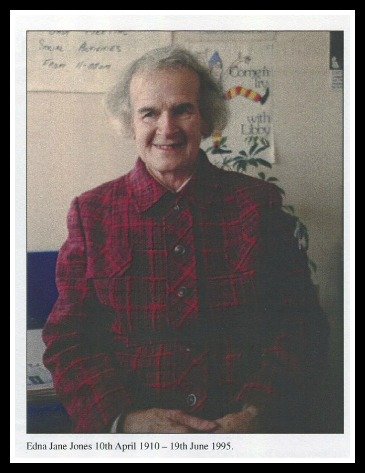
I first learned of Edna’s baby through a casual remark in an email from a former foster carer, which I then repeated to another ex-Warrnambool friend, Bruce Macrae, who I knew was familiar with the history of the Jones’ girls.
“Apparently Edna Jones had a child,” I asked him. “Could that be true?”
“Oh yes,” Bruce said, “I have met her”.
“What!”
And so began my quest to find Marilla, and to talk to her myself.
Bruce pointed me in the direction of Barwon Heads author Janet Paisley, who is a cousin of the Jones’ girls and who was commissioned by the Foundation board to write the Jones’ story, The Jones Girls’ Bounty. Her book was published in 2005.
Talking to Janet revealed the full extent of an unresolved story about social class, loss and grief for Edna, but also the quiet determination of Marilla who, having confirmed her mother’s identity in 1995, set out to remove all the shadows of guilt and shame around her birth.
By the time Janet and Marilla connected, Janet was deep into the research for her book which, of course, provided the perfect opportunity to acknowledge Edna’s “secret” child.
To be part of the official family story would connect Marilla back to her birth family in a way that was both dignified and healing.
But the Foundation decided that there would be no mention of Marilla in the 2005 book and, instead, a chapter might be published in later editions as an epilogue.
With this in mind, Janet interviewed Marilla and has since written an entire chapter about Edna’s baby.
But despite the book being printed 12 years ago and numerous follow-up inquiries by both Janet and Marilla since, they are still waiting for this missing chapter to be published.
As it stands, The Jones Girls’ Bounty contains just 22 words that refer to Edna being involved in “an incident” when she was a young woman.
“I am the incident,” Marilla, who is now in her 70s, tells me by phone, somewhat sardonically.

The stonewalling by the Foundation is one thing, but then there is this: an inexplicable sentence in the book’s foreword, written by James Tait in February 2005:
“They (Gwen and Edna Jones) had no one within a close degree of relationship,” he writes (my emphasis).
When this was written, the board had known of Marilla for years and James had had several contacts with her, including sending her a catalogue for the auction of The Union Station and Gwen and Edna’s possessions in late 2001.
(The Union was sold to Midfield Meats founder and racing identity, Colin McKenna, in November 2001 for more than $7 million.)
Given the board knew of Marilla, why, in early 2005, would its chairman write such a sentence?
I asked James this, together with several other questions that relate to his role as Foundation chair, but have had no reply.
Taits were the Jones’ family lawyers for years, they documented the rules for the Foundation and prepared both Gwen and Edna’s wills, and James has been chair of the Foundation since it began.
He joins other long-serving directors, retired accountant John Hunt, from Coffey Hunt and Co, who were the Jones’ accountants, and retired bank manager and former Warrnambool Citizen of the Year Eric Williams. The fourth, and most recently appointed director is former head of the Warrnambool Racing Club, Margaret Lucas.
This is the group that, for reasons unknown, have so far refused to offer any public acknowledgment of Marilla.
“That recognition is really important to Marilla,” Janet says, “it would offer a closure, of sorts, and it is what she has been waiting for, for many years”.
It is not known if the Foundation directors have even read Janet’s “missing” chapter about Edna’s baby.
They did, however, send Marilla a complimentary copy of the book when it was published.
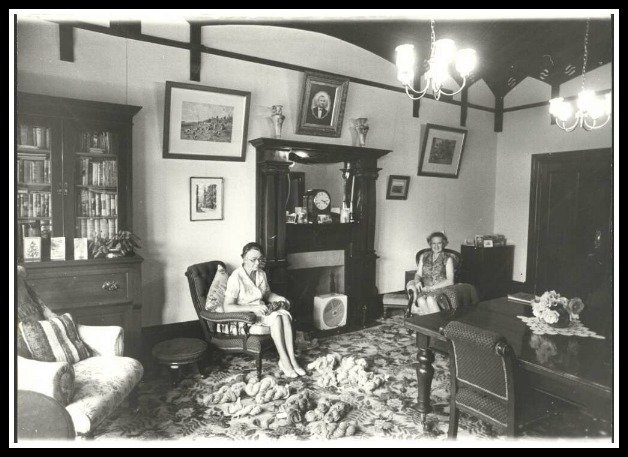
It is partly because of Marilla’s quiet patience and good humour, no doubt, that the Foundation board has been able to continue its stonewalling.
Having spoken to her several times now, Marilla strikes me as someone who has enjoyed a simple, hard-working life (she pursued a nursing career) and is not interested in engaging lawyers, publicly challenging authority, or making a fuss.
She lost her partner early, to cancer, and never had children, so her retired life is one of community work, golf and travelling with friends.
As the years tick past, however, neither Marilla nor Janet, who is now in her 80s, can afford to show endless patience.
“Here we are, 22 years on from when all of this came to light, and we are no closer to a resolution, really,” Marilla says.
“I am experiencing what a lot of adopted people experience when they find their birth parents…but what every adopted person really wants to know is that at least they were wanted”.
As Janet’s chapter outlines, Marilla was denied the opportunity to reconnect with Edna, even though she was alive when Marilla had confirmation that Edna was her birth mother.
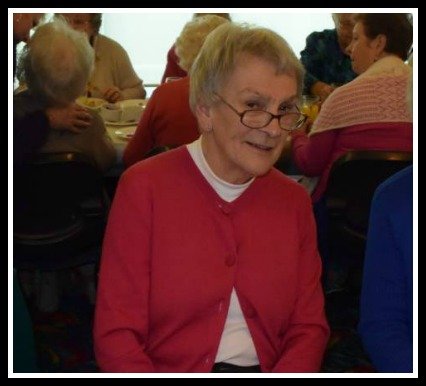
Shortly after tracking down her birth certificate in early 1995, Marilla wrote Edna a letter c/o The Union, Woolsthorpe.
Gwen Jones replied on her sister’s behalf, saying it was best if Marilla did not see her mother, who by then was in the late stages of dementia, saying it would be upsetting. She enclosed an earlier photograph of Edna.
“I got the sense that Gwen did not want to have any involvement whatsoever,” Marilla said.
Edna died in June 1995.
“If I had been able to see her, I would have just thanked her for my life and set her free,” Marilla tells me.
Reading Janet’s book about the Jones’, there is a pervading sense that the fun-loving Edna got to make very few decisions about her life, but was instead guided by her older sister who promised their father, Robert, that she would always take care of her.
And so it makes sense that even though Edna may have gone along with the decision to give up her baby in 1940, she never forgot her.
As Edna developed dementia in the years before her death at the age of 85, those long-buried emotions around Marilla’s birth were no longer constrained.
She was sometimes seen searching the shelves of Swinton’s supermarket for “the baby”, or would follow a mother pushing a young child in a supermarket trolley, or, as one woman told me, she would “come alive” when talking about babies or if a baby was brought into the room.
Despite these very public displays of grief and confusion, Edna’s “baby” was thought by most people to be purely imaginary.
Even Janet, a relative of the family, didn’t know the truth about Marilla until after Gwen’s death in 2000.
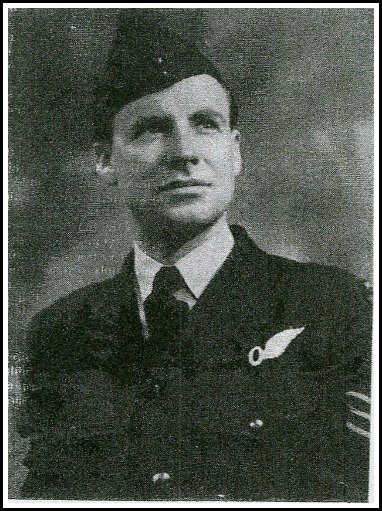
It is since Gwen’s death that Marilla has been given certain access into the Jones’ world, but still not a seat at the main table, so to speak.
In 2001, Marilla was invited by the Foundation to look over The Union before the sale of its contents which were, at the time, being sorted and packed by staff from Coffey Hunt in preparation for one of the most highly anticipated auctions in years.
A few small items that belonged to her mother have since been passed on to Marilla – a cup, saucer and plate – and connections made to lost cousins.
Another particularly poignant moment came in 2011 when Marilla was invited to visit The Union for afternoon tea by Colin McKenna and his partner, Janice, who, Marilla says, “was delightful and very welcoming”. How strange it must have been, however, for Marilla to sit in the historic, blue-chip property that was once half-owned by her birth mother, but to which she had no claim.
In Australia, adopted children have no legal right to the estates of their birth parents, but for Marilla, it has never been about estates.
Instead, her gentle persistence has been driven by the desire to be recognised and have her story – and therefore Edna’s story – brought out of the shadows and into the light.
There was to be no more shame.
Until now, such a wish depended on the decisions of the Foundation, but both Janet and Marilla have now given me permission to publish the draft chapter here, see the link at the end of this story.
This “missing chapter” also reveals the identity of Marilla’s father and the incredible story about how she connected to his family in the south-west.
I thank Janet and Marilla for trusting me with their story and words.



Wow, what a story… and so sad to think that those who are left in charge are being so pig headed as to not give Marilla what she wants, peace of mind for one. I note that the powers that be all are either from the privileged set or have made good of their lives, sitting there in their ivory towers. I am so angry with them!!
Another amazing story carol…..I remember the jones sisters back in the ’70’s when they very often shopped in ‘younger s’ store where I worked at the time…..they were obviously very ‘unique’ ladies……always had a rolled cigi in their mouth……they were amazing to be honest…….a story that is likely only one of many similar during those hard days……thanks so much for sharing once again….a great read…
A powerful story, conveyed with understated goodwill and integrity by Carol and Janet.
Congratulations to both of you for bringing the moral injustice of Marilla’s life to a wider audience and into a more enlightened society than 1940.
If we have evolved at all, achieved anything by 2017, surely people’s lives should be made fairer, particularly when some of us are given the most obvious opportunity to make it happen.
What an amazing story…. so sad & poignant! The truth has a way of coming out..so sad that certain people with power thought they had the right to keep vital information from Marilla and infuriating that she wasn’t able to say her goodbyes to her mother….Poor Edna might’ve been born into a wealthy family, but sadly was trapped & controlled with no life of her own…. I wonder if I had seen her in Swinton’s…heartbreaking that she was always looking for her baby! How dare the Trust behave in such away – it’s disgraceful. Thank you for posting Carol.
Well done Carol, a great (but sad) story to share.
Great story Carol; such fascinating history and moral dilemma in wild Woolsthorpe and Warrnambool!
A well written complex human story Carol. Marilla is a beautiful woman who in the year 2017 is still being unjustly treated along with no proper recognition given to her from the foundation. A positive outcome must occur asap for her.
Was it ever really the Foundations place to tell the story?
Two fine and generous ladies… please both rest in peace
A good question Sue, but I guess one thing that leapt to mind for me is if not the Foundation, then who?
“Giving up” a child for adoption should not equate to refusing or negating on-going ethical, biological and financial responsibility – in my book anyway.
I can’t help thinking of the joy Marilla would have brought to the Jones sisters and their father if they had accepted her in the first place.
However, in the now absence of her immediate biological family, Marilla’s extended next of kin have the right to re-appeal to the Jones Foundation.
And now that this is a public issue, there are many more of us who are in a position to give support to Marilla’s rightful acknowledgement as a member of the Jones and Jenkins families. The Jones Foundation have the power to bring this about and perhaps we do too.